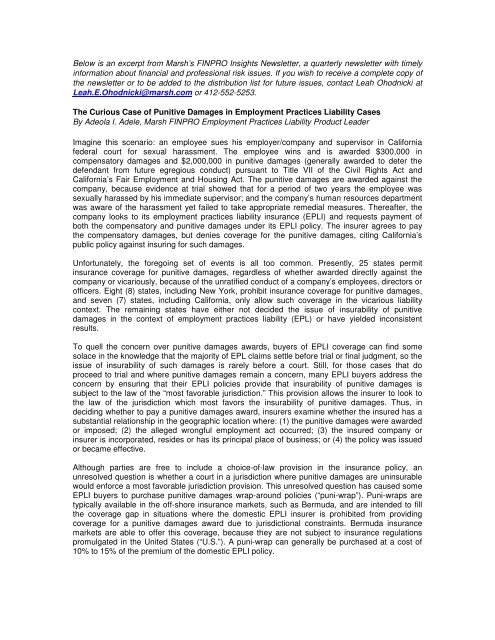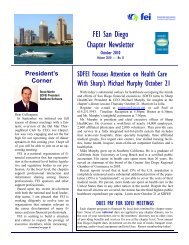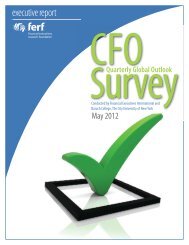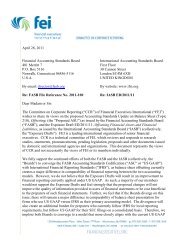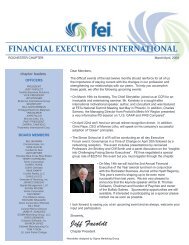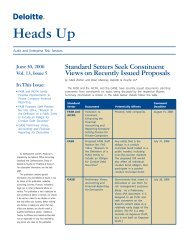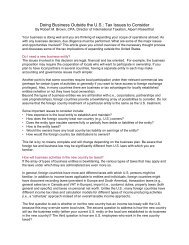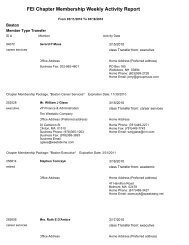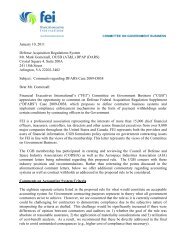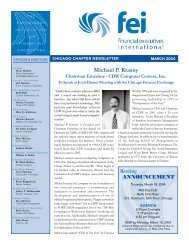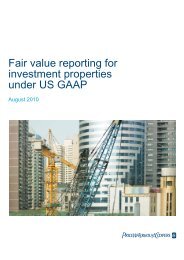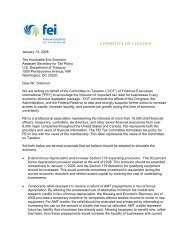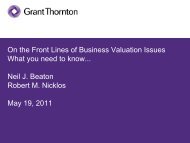Below is an excerpt from Marsh's FINPRO Insights Newsletter, a ...
Below is an excerpt from Marsh's FINPRO Insights Newsletter, a ...
Below is an excerpt from Marsh's FINPRO Insights Newsletter, a ...
You also want an ePaper? Increase the reach of your titles
YUMPU automatically turns print PDFs into web optimized ePapers that Google loves.
<strong>Below</strong> <strong>is</strong> <strong>an</strong> <strong>excerpt</strong> <strong>from</strong> Marsh’s <strong>FINPRO</strong> <strong>Insights</strong> <strong>Newsletter</strong>, a quarterly newsletter with timely<br />
information about fin<strong>an</strong>cial <strong>an</strong>d professional r<strong>is</strong>k <strong>is</strong>sues. If you w<strong>is</strong>h to receive a complete copy of<br />
the newsletter or to be added to the d<strong>is</strong>tribution l<strong>is</strong>t for future <strong>is</strong>sues, contact Leah Ohodnicki at<br />
Leah.E.Ohodnicki@marsh.com or 412-552-5253.<br />
The Curious Case of Punitive Damages in Employment Practices Liability Cases<br />
By Adeola I. Adele, Marsh <strong>FINPRO</strong> Employment Practices Liability Product Leader<br />
Imagine th<strong>is</strong> scenario: <strong>an</strong> employee sues h<strong>is</strong> employer/comp<strong>an</strong>y <strong>an</strong>d superv<strong>is</strong>or in California<br />
federal court for sexual harassment. The employee wins <strong>an</strong>d <strong>is</strong> awarded $300,000 in<br />
compensatory damages <strong>an</strong>d $2,000,000 in punitive damages (generally awarded to deter the<br />
defend<strong>an</strong>t <strong>from</strong> future egregious conduct) pursu<strong>an</strong>t to Title VII of the Civil Rights Act <strong>an</strong>d<br />
California’s Fair Employment <strong>an</strong>d Housing Act. The punitive damages are awarded against the<br />
comp<strong>an</strong>y, because evidence at trial showed that for a period of two years the employee was<br />
sexually harassed by h<strong>is</strong> immediate superv<strong>is</strong>or; <strong>an</strong>d the comp<strong>an</strong>y’s hum<strong>an</strong> resources department<br />
was aware of the harassment yet failed to take appropriate remedial measures. Thereafter, the<br />
comp<strong>an</strong>y looks to its employment practices liability insur<strong>an</strong>ce (EPLI) <strong>an</strong>d requests payment of<br />
both the compensatory <strong>an</strong>d punitive damages under its EPLI policy. The insurer agrees to pay<br />
the compensatory damages, but denies coverage for the punitive damages, citing California’s<br />
public policy against insuring for such damages.<br />
Unfortunately, the foregoing set of events <strong>is</strong> all too common. Presently, 25 states permit<br />
insur<strong>an</strong>ce coverage for punitive damages, regardless of whether awarded directly against the<br />
comp<strong>an</strong>y or vicariously, because of the unratified conduct of a comp<strong>an</strong>y’s employees, directors or<br />
officers. Eight (8) states, including New York, prohibit insur<strong>an</strong>ce coverage for punitive damages,<br />
<strong>an</strong>d seven (7) states, including California, only allow such coverage in the vicarious liability<br />
context. The remaining states have either not decided the <strong>is</strong>sue of insurability of punitive<br />
damages in the context of employment practices liability (EPL) or have yielded incons<strong>is</strong>tent<br />
results.<br />
To quell the concern over punitive damages awards, buyers of EPLI coverage c<strong>an</strong> find some<br />
solace in the knowledge that the majority of EPL claims settle before trial or final judgment, so the<br />
<strong>is</strong>sue of insurability of such damages <strong>is</strong> rarely before a court. Still, for those cases that do<br />
proceed to trial <strong>an</strong>d where punitive damages remain a concern, m<strong>an</strong>y EPLI buyers address the<br />
concern by ensuring that their EPLI policies provide that insurability of punitive damages <strong>is</strong><br />
subject to the law of the “most favorable jur<strong>is</strong>diction.” Th<strong>is</strong> prov<strong>is</strong>ion allows the insurer to look to<br />
the law of the jur<strong>is</strong>diction which most favors the insurability of punitive damages. Thus, in<br />
deciding whether to pay a punitive damages award, insurers examine whether the insured has a<br />
subst<strong>an</strong>tial relationship in the geographic location where: (1) the punitive damages were awarded<br />
or imposed; (2) the alleged wrongful employment act occurred; (3) the insured comp<strong>an</strong>y or<br />
insurer <strong>is</strong> incorporated, resides or has its principal place of business; or (4) the policy was <strong>is</strong>sued<br />
or became effective.<br />
Although parties are free to include a choice-of-law prov<strong>is</strong>ion in the insur<strong>an</strong>ce policy, <strong>an</strong><br />
unresolved question <strong>is</strong> whether a court in a jur<strong>is</strong>diction where punitive damages are uninsurable<br />
would enforce a most favorable jur<strong>is</strong>diction prov<strong>is</strong>ion. Th<strong>is</strong> unresolved question has caused some<br />
EPLI buyers to purchase punitive damages wrap-around policies (“puni-wrap”). Puni-wraps are<br />
typically available in the off-shore insur<strong>an</strong>ce markets, such as Bermuda, <strong>an</strong>d are intended to fill<br />
the coverage gap in situations where the domestic EPLI insurer <strong>is</strong> prohibited <strong>from</strong> providing<br />
coverage for a punitive damages award due to jur<strong>is</strong>dictional constraints. Bermuda insur<strong>an</strong>ce<br />
markets are able to offer th<strong>is</strong> coverage, because they are not subject to insur<strong>an</strong>ce regulations<br />
promulgated in the United States (“U.S.”). A puni-wrap c<strong>an</strong> generally be purchased at a cost of<br />
10% to 15% of the premium of the domestic EPLI policy.
Finally, purchasing a st<strong>an</strong>d-alone EPLI policy <strong>from</strong> Bermuda perhaps offers the most assur<strong>an</strong>ce<br />
that punitive damages would be eligible for coverage (subject to all other terms <strong>an</strong>d conditions of<br />
the particular policy), because such damages are automatically included in the policy. Similar to<br />
the puni-wrap, st<strong>an</strong>d-alone EPLI policies purchased in Bermuda are not subject to U.S. insur<strong>an</strong>ce<br />
regulations.<br />
Punitive damages remain the single largest exposure facing comp<strong>an</strong>ies in EPL cases, with such<br />
damages being awarded in nearly 20% of all cases that proceed to trial. These damages are also<br />
often a factor in the settlement of cases, thus driving up the settlement value. Therefore, as the<br />
current economic conditions continue to contribute to <strong>an</strong> increase in frequency <strong>an</strong>d severity of<br />
EPL claims, obtaining insur<strong>an</strong>ce coverage for punitive damages, to the extent permitted by law, <strong>is</strong><br />
of paramount import<strong>an</strong>ce.<br />
Marsh will host a seminar on Employment Practices during Difficult Economic Times on<br />
November 4. Adeola Adele will be a p<strong>an</strong>el<strong>is</strong>t at th<strong>is</strong> seminar. If you are interested in<br />
learning more, please contact Leah Ohodnicki at Leah.E.Ohodnicki@marsh.com or 412-<br />
552-5253.


